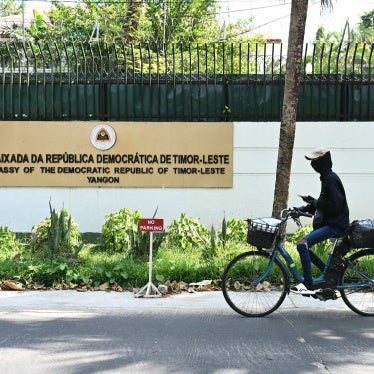This mandate is more important than ever. The world is a divisive place, and multiplying human rights crises darken many corners of the globe. Against this, the ICC stands for the determination of the international community that these crimes will not go unpunished – that no one should be above the law and no victim should be ignored by the law.
The court’s mandate is more important than ever and this, in turn, makes the work of this Assembly of critical importance.
This session takes place within a matter of weeks of the first withdrawals from the Rome Statute, by the governments of Burundi, Gambia, and South Africa.
These withdrawals challenge the goal of an ICC with a global reach, and they betray those victims who look to the international community to support the ICC as a court of last resort when other avenues to justice are closed.
But these withdrawals should not challenge the foundations of this court.
In adopting the Rome Statute, and later in its ratification, your governments signed on to an independent court, and an independent prosecutor. Your governments signed on to a court before which even the most powerful can be held to account when they brutalize and violate. And in the nearly twenty years since the Rome Statute’s adoption, your governments have worked together – including against political attacks on the court, like those of the early years of the George W. Bush administration – to ensure that the promise of that treaty has increasingly become a reality.
Implementing the ICC’s mandate was never going to be easy and there have been shortcomings. Its work has been affected by the vast discrepancies in political and economic power in the global order that reverberate in the uneven application of international justice. ICC member countries need to work to erase these double-standards over time.
But the ICC is and should remain a court worth having. If the price of universality is a court compromised – if the price is justice compromised – it is simply too high a price.
Therefore, while the Assembly can and should be a place for principled discussion, member countries should not engage in initiatives at this Assembly session that could compromise the ICC’s effective functioning.
There has been a concerning trend for Assembly discussions to go beyond dialogue, and into negotiations on Assembly texts that blur an essential line between the Assembly’s legislative and oversight role and the court’s judicial independence.
Instead, what is most needed now is firm commitment to the ICC’s core principles, and an encouragement among all ICC member countries to retain their strong support to the court. We look to your governments to signal their commitment to the ICC at this Assembly session, and to stand behind the ICC, and on the side of victims. This is all the more important given the challenging times we all see ahead.
The Assembly has important business before it in these next days, including setting the court's budget. The court needs adequate resources to carry out investigations to meet rising demands for accountability and to deepen the court's impact, where it matters most--locally, with victims and affected communities. We urge all member countries--regardless of their size of financial contribution--to be concerned and invested in the outcome of this year's budget negotiations.
July 2018 will see the twentieth anniversary of the adoption of the Rome Statute. We call on the Assembly to include a special plenary discussion to mark this anniversary in its agenda at the Assembly’s sixteenth session in 2017.
While the ICC is increasingly growing into maturity, 2018 looks set to be a vastly different time than 1998. The landscape on which the ICC works has never been more challenging. The court’s cases have attracted political backlash, and, meanwhile, multiplying human rights crises around the globe have meant that demand for justice is far exceeding the resources available to the court.
A special plenary discussion would offer an opportunity to take stock of achievements to date, while grappling with this changed landscape. It would anticipate anniversary events over the course of 2018 while charting a course to ensure that the ICC will have what it needs, in political support and budgetary resources, to succeed on its mandate in the years ahead. We call on your governments to include a mandate within this year’s Omnibus resolution for the preparation of this special plenary discussion at next year’s Assembly session.








